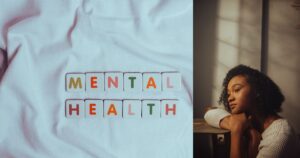Anxiety is a normal human emotion that can be experienced by anyone, in response to a perceived threat or stressor. However, when anxiety becomes persistent, excessive, and interferes with daily functioning, it can become a mental health disorder. Anxiety disorders are the most common mental health conditions worldwide, affecting millions of people of all ages and backgrounds. They can range from generalized anxiety disorder (GAD), panic disorder, social anxiety disorder, obsessive-compulsive disorder (OCD), and post-traumatic stress disorder (PTSD), among others.
Anxiety can be caused by a variety of factors, including genetics, brain chemistry, environmental stressors, and life experiences. The symptoms of anxiety can be physical, emotional, and behavioral, and can significantly impact a person’s quality of life. Effective treatment options, including therapy, medication, and lifestyle changes, can help individuals manage their anxiety and improve their overall well-being.In this blog post we will discuss more about anxiety.

What is anxiety ?
Anxiety is a feeling of worry, fear, or unease about future events or uncertain outcomes. When anxiety becomes excessive or persistent, it can interfere with daily life and become a mental health disorder.
Yoy may also like... stress- causes ,effects ,symptoms, stress ,management pimple home remedies acne remedies split hair ends remedies tips for hair growth
Types of anxiety
There are several types of anxiety disorders, including:
1.Generalized anxiety disorder (GAD):
It is characterized by excessive and persistent worry about a variety of everyday concerns.
2.Panic disorder:
It is characterized by sudden and recurrent panic attacks, which are intense episodes of fear and physical symptoms such as heart palpitations, chest pain, and difficulty breathing.
3.Social anxiety disorder:
It is characterized by excessive fear or anxiety in social situations, which can result in avoidance behavior.
4.Specific phobias:
It is characterized by intense fear and avoidance of a specific object or situation, such as heights, spiders, or flying.
5.Obsessive-compulsive disorder (OCD):
It is characterized by intrusive and unwanted thoughts, images, or impulses (obsessions) that lead to repetitive behaviors or mental acts (compulsions) in an attempt to alleviate anxiety.
6.Post-traumatic stress disorder (PTSD):
It can occur after exposure to a traumatic event and is characterized by symptoms such as intrusive thoughts or memories, avoidance behavior, and hyperarousal.
It’s worth noting that anxiety can also be a symptom of other mental health conditions, such as depression or bipolar disorder.
Causes of anxiety
Anxiety can be caused by a combination of genetic, environmental, and psychological factors. Some common causes of anxiety include:
1.Genetics:
A family history of anxiety disorders can increase the likelihood of developing anxiety.
2.Brain chemistry:
Imbalances in neurotransmitters, such as serotonin and dopamine, can contribute to anxiety.
3.Environmental stressors:
Traumatic events, financial stress, relationship problems, and other life stressors can trigger or exacerbate anxiety.
4.Medical conditions:
Certain medical conditions, such as heart disease, thyroid disorders, and chronic pain, can increase the risk of anxiety.
5.Substance abuse:
Use of drugs or alcohol can contribute to anxiety, either as a result of the substance itself or as a way to cope with underlying anxiety.
6.Personality traits:
People with certain personality traits, such as perfectionism or a tendency to worry, may be more prone to anxiety.
It’s important to note that anxiety can also be a normal and adaptive response to stress or danger, and not all anxiety is caused by a disorder. However, when anxiety becomes excessive or persistent and interferes with daily life, it may be a sign of an anxiety disorder that requires treatment.
Risk factors of anxiety
There are several risk factors that may increase the likelihood of developing an anxiety disorder, including:
1.Family history:
A family history of anxiety disorders or other mental health conditions can increase the risk of developing anxiety.
2.Childhood experiences:
Traumatic experiences in childhood, such as abuse, neglect, or loss, can increase the risk of anxiety disorders later in life.
3.Chronic medical conditions:
Chronic medical conditions, such as asthma, diabetes, or heart disease, can increase the risk of developing anxiety.
4.Substance use:
Substance use, including drugs and alcohol, can increase the risk of developing anxiety disorders.
5.Personality traits:
Certain personality traits, such as a tendency to worry or being overly self-critical, can increase the risk of anxiety.
6.Life stressors:
Major life stressors, such as divorce, job loss, or financial difficulties, can increase the risk of developing anxiety.
7.Gender:
Women are more likely than men to develop anxiety disorders.
It’s important to note that having one or more of these risk factors does not necessarily mean that a person will develop an anxiety disorder. However, being aware of these risk factors can help individuals take steps to manage their anxiety and reduce their risk of developing an anxiety disorder.
Symptoms of anxiety
The symptoms of anxiety can vary depending on the individual and the specific type of anxiety disorder. However, common symptoms of anxiety include:
1.Excessive worry or fear:
A feeling of apprehension or unease about future events or uncertain outcomes that is out of proportion to the actual threat.
2.Restlessness or feeling on edge:
An inability to relax or feeling constantly on guard or irritable.
3.Physical symptoms:
Anxiety can cause physical symptoms such as increased heart rate, sweating, shaking, muscle tension, and difficulty breathing.
4.Panic attacks:
Intense episodes of fear or terror that can cause physical symptoms such as chest pain, shortness of breath, or dizziness.
5.Avoidance behaviors:
Avoiding certain situations or activities due to fear or anxiety, which can interfere with daily life.
6.Obsessive thoughts or compulsive behaviors:
Recurrent and intrusive thoughts or images, or repetitive behaviors that are performed to alleviate anxiety.
7.Sleep disturbances:
Difficulty falling or staying asleep, or experiencing nightmares or vivid dreams.
It’s important to note that not all anxiety is caused by an anxiety disorder, and that experiencing occasional feelings of worry or fear is normal. However, if anxiety becomes excessive or persistent and interferes with daily life, it may be a sign of an anxiety disorder that requires treatment.
Diagnosis of anxiety
A diagnosis of anxiety disorder is typically made by a mental health professional, such as a psychiatrist or psychologist, based on a thorough evaluation of a person’s symptoms and medical history. The diagnostic process for anxiety may include:
1.Physical examination:
The healthcare provider may perform a physical examination or order laboratory tests to rule out any underlying medical conditions that may be contributing to the symptoms.
2.Psychological evaluation:
The healthcare provider may conduct a psychological evaluation to assess the person’s symptoms, thoughts, and feelings, and to determine whether there are any underlying mental health conditions.
3.Diagnostic criteria:
The healthcare provider will assess whether the person’s symptoms meet the diagnostic criteria for an anxiety disorder, as outlined in the Diagnostic and Statistical Manual of Mental Disorders (DSM-5).
4.Differential diagnosis:
The healthcare provider will rule out other potential causes of the symptoms, such as substance use or medical conditions.
5.Collaboration with other healthcare providers:
The healthcare provider may collaborate with other healthcare providers, such as a primary care physician, to ensure that the person receives comprehensive care.
It’s important to note that a diagnosis of anxiety disorder is not a judgment or a label, but rather a way to help healthcare providers understand and treat a person’s symptoms. A diagnosis can also help to guide treatment planning and improve outcomes.
Treatment of anxiety
There are several effective treatments for anxiety, including:
1.Psychotherapy:
Psychotherapy, also known as talk therapy, involves working with a mental health professional to address the underlying thoughts, feelings, and behaviors that contribute to anxiety. Common types of psychotherapy used to treat anxiety include cognitive behavioral therapy (CBT), exposure therapy, and mindfulness-based therapies.
2.Medication:
Medications such as antidepressants, anti-anxiety drugs, can be effective in reducing the symptoms of anxiety. These medications are typically prescribed by a psychiatrist or other healthcare provider.
3.Lifestyle changes:
Lifestyle changes such as regular exercise, healthy eating, and getting enough sleep can help to reduce anxiety symptoms.
4.Stress management techniques:
Techniques such as relaxation exercises, deep breathing, and meditation can help to reduce anxiety symptoms.
5.Support groups:
Support groups, either online or in-person, can provide a sense of community and support for people with anxiety disorders.
It’s important to note that the most effective treatment for anxiety may vary depending on the individual and the specific type of anxiety disorder. Treatment often involves a combination of psychotherapy, medication, and lifestyle changes, and it may take time to find the right combination that works for an individual. It’s also important to work with a healthcare provider or mental health professional to develop a personalized treatment plan.
Some natural remedies for Anxiety
How Can I Reduce My Anxiety Naturally
While natural remedies for anxiety may be helpful for some individuals, it’s important to note that they are not a substitute for professional medical treatment. It’s important to talk to a healthcare provider or mental health professional before trying any natural remedies, as they may interact with medications or have other risks or side effects.
That being said, some natural remedies that may be helpful for anxiety include:
1.Exercise:
Regular exercise, such as walking, jogging, or yoga, can help to reduce symptoms of anxiety and improve overall mental health.
2.Relaxation techniques:
Deep breathing, progressive muscle relaxation, and guided imagery are techniques that can help to reduce anxiety symptoms.
3.Chamomile:
Chamomile is an herb that may have calming effects and help to reduce anxiety symptoms.
4.Lavender:
Lavender is an herb that may have calming effects and help to reduce anxiety symptoms. It can be used in aromatherapy or as an oil for massage.
5.Passionflower:
Passionflower is an herb that may have calming effects and help to reduce anxiety symptoms.
6.Valerian root:
Valerian root is an herb that may have calming effects and help to reduce anxiety symptoms.
7.Lemon balm:
Lemon balm is an herb that may have calming effects and help to reduce anxiety symptoms.
8.Omega-3 fatty acids:
Omega-3 fatty acids, found in fatty fish such as salmon, may help to reduce anxiety symptoms.
9.Mindfulness meditation:
Mindfulness meditation is a practice that can help to reduce anxiety symptoms and improve overall mental health.
10.Yoga:
Yoga is a practice that can help to reduce anxiety symptoms and improve overall mental health.
It’s important to note that natural remedies may interact with medications or have other risks or side effects, so it’s important to talk to a healthcare provider or mental health professional before trying any natural remedies for anxiety.
Managing Anxiety.
Anxiety is a complex and multifaceted condition that can have a significant impact on an individual’s daily life. It is characterized by feelings of worry, fear, and unease, and can manifest in a variety of physical and emotional symptoms. While anxiety is a normal part of the human experience, chronic and excessive anxiety can be debilitating and may require treatment.
There are several effective treatments for anxiety, including therapy, medication, and lifestyle changes. Therapy can help individuals identify and address the underlying causes of their anxiety, while medication can alleviate symptoms and improve overall functioning. Lifestyle changes such as exercise, meditation, and stress management techniques can also help reduce anxiety and improve overall well-being.
It is important to remember that seeking help for anxiety is a sign of strength, and that with the right support and resources, individuals can learn to manage their anxiety and lead fulfilling lives.
Conclusion
In conclusion, anxiety is a common and often overwhelming condition that affects millions of people worldwide. The causes of anxiety are varied and complex, and its symptoms can range from mild to severe. However, with the right treatment and support, individuals with anxiety can learn to manage their symptoms and improve their quality of life.
There are many effective treatments available for anxiety, including therapy, medication, and lifestyle changes. Each person’s experience with anxiety is unique, and finding the right treatment approach may require some trial and error. However, the benefits of seeking help for anxiety are clear: improved emotional well-being, better physical health, and the ability to lead a more fulfilling life.
It is important for individuals with anxiety to know that they are not alone, and that there is no shame in seeking help. With compassion, patience, and the right resources, it is possible to overcome anxiety and regain control over one’s life.
Disclaimer: The advice and suggestions mentioned in the article are for general information purpose only and it should not be taken as professional medical advice. Always consult your doctor if you have any questions or concerns.
FAQs
.What is panic attack?
A panic attack is a sudden onset of intense fear or discomfort accompanied by physical symptoms such as heart palpitations, sweating, and shortness of breath.
What are symptoms of panic attack?
Symptoms of a panic attack include sudden feelings of intense fear, rapid heartbeat, sweating, trembling or shaking, shortness of breath, chest pain, nausea or stomach discomfort, dizziness or lightheadedness, and a sense of impending doom or loss of control.
What are symptoms of anxiety ?
Anxiety symptoms can manifest physically, such as muscle tension, restlessness, fatigue, and sleep disturbances, as well as mentally and emotionally, such as excessive worrying, fear or dread, difficulty concentrating, irritability, and avoidance behaviors. These symptoms can vary in intensity and duration depending on the individual and the underlying cause of their anxiety.
What is phobia ?
A phobia is an intense, persistent fear or avoidance of a specific object, situation, or activity that is out of proportion to the actual threat posed, and which significantly interferes with the person's daily life and functioning. It is considered a type of anxiety disorder.
What is social anxiety?
Social anxiety is a type of anxiety disorder characterized by a persistent and excessive fear or anxiety of social situations, such as speaking in public, meeting new people, or attending social gatherings, due to a fear of embarrassment, rejection, or scrutiny by others.
What is separation anxiety ?
Separation anxiety is a type of anxiety disorder that typically occurs in children and is characterized by excessive distress or fear when faced with actual or anticipated separation from a parent or caregiver, leading to behaviors such as crying, tantrums, and clinginess. In some cases, it can also occur in adults.
How to deal with anxiety?
Dealing with anxiety can involve a combination of strategies, including practicing relaxation techniques like deep breathing and mindfulness, engaging in regular exercise and a healthy diet, seeking support from trusted friends or a mental health professional, and considering medication as an option in severe cases. The most effective approach may vary depending on the individual and the severity of their anxiety
Can anxiety cause chest pain?
Yes, anxiety can cause chest pain, as it can trigger physical symptoms such as muscle tension, increased heart rate, and shallow breathing, which can lead to sensations of tightness, pressure, or discomfort in the chest area. However, it is important to rule out any other underlying medical conditions that may cause chest pain, such as heart disease, by consulting a healthcare professional.
What is the sign of anxiety ?
The signs of anxiety can include excessive worrying, restlessness, irritability, difficulty concentrating, and physical symptoms such as muscle tension, racing heartbeat, and shortness of breath.
Is health anxiety a mental illness ?
Yes, health anxiety, also known as illness anxiety disorder or somatic symptom disorder, is considered a mental illness. It is characterized by a preoccupation or excessive fear of having a serious illness, despite having no or mild symptoms, and can lead to excessive health-related behaviors, such as seeking reassurance from healthcare professionals or repeatedly checking for signs of illness.




